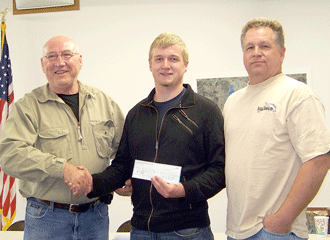June 20, 2013 at 12:12 p.m.
Rush Lake Improvement Association annual meeting provides update on activities, scholarship presented
Members of the Rush Lake Improvement Association heard that the non-profit group is increasing its curlyleaf pondweed chemical treatments by three-times the potency of what has previously been applied. The costs to treat also escalate, with $26,400 projected as association treatment expenses this year, and just 35 acres being done in total. The Dept. of Natural Resources also awarded the RLIA a $3,500 grant to help with the spraying. Application was done May 23, with calm conditions that were “perfect” for applying aquathol K, an approved herbicide. The association members were informed at the Saturday annual meeting of another approximately $3,000 or so donated-- leaving the association with a bill of about $20,000 for the chemical application. Association members were shown a map of treated lake acres and also heard that the DNR identified fish “habitat” zones requiring the spraying crew to stay 150 feet away from. The association treats mainly boating lanes and places where weed growth inhibits acces to public spots.
RLIA is also working with a carp-tagger from Wisconsin, who is assisting the association to track carp. Association member Gary Reilly reported 10 fish total will have transponders sewn into them under sterile conditions. The devices then allow schools of carp to be more easily located. The carp harvest in the wintertime then becomes more cost-effective with this ability to pinpoint where the rough fish are schooling. The goal in removing carp is to improve both water clarity and desired fish habitat. Iron Filings Update The RLIA will continue to monitor results of the iron filings project. David Cartwright, association board member, said the “jury is still out” on the success of reducing weed growth. He reported that there will be sediment samples analyzed to see if the filings are sequestering phosphorus, making the phosphorus unavailable as a nutrient for weed growth. (The RLIA took 50 samples of sediment in 2000 to compare recent samples to.) The RLIA has applied many tons of iron filings to 13 acres, in Rush Lake both via open water distribution and through holes cut into the ice. The project is experimental, but based on use of iron filings to clarify Lake Vadnais in St. Paul and on other evidence that high iron lakes experience water clarity.
The University of Minnesota has also developed a relatively new method of embedding iron particles into stormwater filtration systems, to remove phosphorus from run-off as it seeps into the ground in bermed areas. And, RLIA charitable gambling manager Ron Eiden reported revenues are way up, and it may be due to a cool spring, keeping people indoors at the Grumpy Minnow and Sidelines, playing pulltabs. He added that both sites are excellent to work with and the RLIA pulltab booth workers are doing a great job. The RLIA reported a little over $1 million in sales last year. The RLIA gets no tax dollars, it funds channel maintenance, volunteer iceout clean-up/disposal costs, weed treatments, website (www.rlia.org) etc. mainly out of dues, donations, grants and charitable gaming. The RLIA meets the third Saturday of the month at Nessel Township Hall at 8:30 a.m. It is overseen by members and the eight-person Board of Directors.



Comments:
Commenting has been disabled for this item.